
Spanish and Portuguese ETDs
Publication Date
8-6-1970
Abstract
Ecuador is known in the world of letters for more than one writer of continental renown, among them being José Joaquín Olmedo, Juan León Mera, Juan Montalvo, Jorge Carrera Andrade, Alfredo Pareja Diez-Canseco, and Jorge Icaza. Critics, in general, have rated the last as the greatest of the indigenist writers of Ecuador as well as one of the most outstanding novelists of the Indian theme in all of Hispanic America. Nevertheless, the literary activity of this Ecuadorian writer is not restricted exclusively to the novel as a genre, nor to the Indian as theme. Theater, short story and novel constitute the complete scope of his literary, political and social concerns. Furthermore, he is equally preoccupied with the mestizo--for him the keystone of Latin American society--as he is with the tragedy of the aborigine. Jorge Icaza was initiated into the field of letters as an actor and theatrical writer, winning widespread applause on the national scene. Seven pieces, aside from his numerous roles as an actor, testify to his labor in this field. They are, in chronological order: El intruso (1928), La comedia sin nombre (1929), Por el viejo (1929), ¿Cuál es? (1931), Como ellos quieren (1931), Sin sentido (1932), and Flagelo (1936). The first three pieces reveal strong influence of the Spanish theater of customs and of French vaudeville, while the latter reflect equally his intellectual preoccupations and his political-social tendencies. In the last work, Icaza shows himself to be a true artist of agitation, both in his own society and in that of Spanish America in general. The short story and the novel are the tribunal for those preoccupations. Two collections of short stories, Barro de la Sierra (1933), and Seis relatos (1952)--as well as Viejos cuentos (1954), a reconstruction of some of them together with assorted others--are his contributions to the former genre. Huasipungo (1934), En las calles (1935), Cholos (1938), Media vida deslumbrados (1942), Huairapamushcas (1948), and El chulla Romero y Flores (1958), give testimony to his novelistic activity. In the first chapter of this thesis the writer and the genesis of his literary work are presented, showing how the work was shaped by circumstantial reality and tied strongly to the author's personality. In the following chapter, Icaza's theatrical work is studied in detail, emphasizing the techniques employed, as well as the Freudian and Marxist preoccupations of the author together with his rebellious call for social justice and respect for human dignity. The next chapter is dedicated to the detailed analysis of each of the stories which make up the two principal collections, as well as the author's social protest on behalf of the Indian, the mestizo, and the deprived proletariat; that is to say, his well known leftist militancy, especially notable in Barro de la Sierra. The following four chapters deal with Icaza's novels. Particular emphasis has been placed on the study of the disputed novel, Huasipungo, one of Latin America's greatest allegations in favor of the Indian. Finally, in the last chapter, the conclusions are presented, according to which Icaza emerges not only as one of the greatest defenders of the Indian, but also as the novelist of the mestizo, the "common man of America" oppressed by infinite problems, but in full march toward the realization of his destiny. The present study embraces the socio-political, as well as the literary values of Icaza's works. The author is perceived as a talented artist deeply committed to his own society and endowed with a three-fold mission eminently, though not exclusively, his own. By virtue of this triple impact, Icaza stands as one of the great names in twentiethcentury Latin American letters.
Degree Name
Spanish & Portuguese (PhD)
Level of Degree
Doctoral
Department Name
Spanish and Portuguese
First Committee Member (Chair)
Marshall Rutherford Nason
Second Committee Member
William Holloway Roberts
Third Committee Member
Julián Eugene White Jr.
Language
Spanish
Document Type
Dissertation
Recommended Citation
Alarcón, Jorge Neptalí. "Jorge Icaza y Su Creación Literaria." (1970). https://digitalrepository.unm.edu/span_etds/161
Included in
European Languages and Societies Commons, Latin American Languages and Societies Commons
